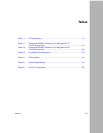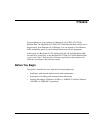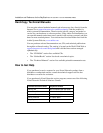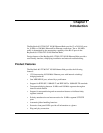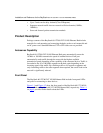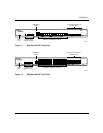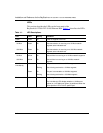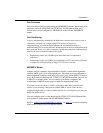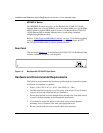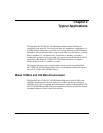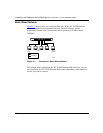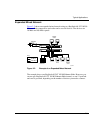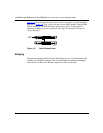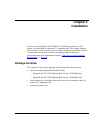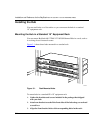
Introduction
206378-A
1-5
Port Functions
This section describes port partitioning and MDI/MDI-X modes. Partitioning is an
automatic function of BayStack 60-12T/60-24T 10/100 Ethernet Hub ports.
Certain ports can be configured to MDI/MDI-X mode with the MDI/MDI-X
button.
Port Partitioning
A port is automatically disabled by the hub when a serious error occurs, such as
continuous collisions on a single packet. This process is known as
autopartitioning. A partitioned port indicates an overloaded network or a
malfunctioning device on the network. When the port receives a valid packet from
the connected device, or is able to transmit a packet from the port, it automatically
releases the port so that it becomes active again.
• Partitioning occurs at a 100 Mb/s port when there are 61 consecutive
collisions.
• Partitioning occurs at a 10 Mb/s port when there are 32 consecutive collisions,
or when one collision lasting as long as 575.2us has occurred.
MDI/MDI-X Modes
Adapter cards in computers and workstations usually contain media-dependent
interface (MDI) ports, also called uplink ports. Most hub ports are configured as
media-dependent interfaces with built-in crossover ports, called MDI-X or normal
ports. By default, all BayStack 60-12T/60-24T 10/100 Ethernet Hub ports are set
to MDI-X, or normal, mode. You can connect your hub to computers and
workstations in MDI-X mode using a standard straight-through cable.
You need a crossover cable to connect your hub to other hubs, switches and
routers if you are using a hub port in normal, MDI-X, mode. You can use a
straight-through cable to connect to these devices if you configure a port on your
hub to the uplink mode.
You can configure port 1 on the BayStack 60-12T/60-24T 10/100 Ethernet Hub
from normal to uplink mode with the MDI/MDI-X button.
Refer to “
Cable Types and MDI/MDI-X Modes” on page 3-3 for details regarding
which cable or mode to use for specific devices.



